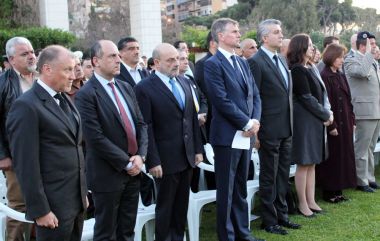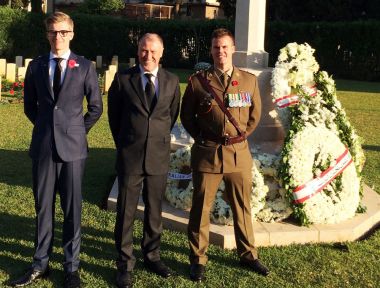CANDLE-LIT CEREMONY COMMEMORATES ANZAC DAY AT THE COMMONWEALTH WAR GRAVES CEMETARY IN BEIRUT (Translation of this article appears in Arabic section) Shortly before dawn this morning, Ministers for Defense, Yaacoub Sarra, and Social Affairs, Pierre Bou Assi, joined Ambassadors, Defense Attachés, heads of UN agencies, and over 100 other guests, for a candle-lit service to commemorate ANZAC Day at the Commonwealth War Graves cemetery in Qasqas. 
The ANZAC (Australia and New Zealand Army Corps) tradition dates back to the same early hour on 25 April 1915, when 16,000 Australian and New Zealand troops commenced landing under fire on the Turkish beaches of Gallipoli. It was to be a defining moment in the histories of both nations. In all, over 8,700 Australians and 2,700 New Zealanders – alongside many thousands of British, Allied and Turkish soldiers – lost their lives at Gallipoli. Delivering the commemorative address, Australian Ambassador Glenn Miles paid particular tribute to the Lebanese-Australian soldiers who were among the fallen. “Lebanese Australians served in all Australian campaigns of both the First and Second World Wars - including Gallipoli. And like their countrymen, too many paid the ultimate sacrifice.” “Tragically, one of the first Australian casualties of Second World War’s Syria Campaign was Nicholas, or Nick, Koorey, an Australian solider of Lebanese descent, whose family lived in Marjaayoun, a town close to where he was killed. Nick operated a drapery shop before the war near Australia’s Capital, Canberra and was aged 26 years when he died. He was one of 441 Australians killed in the Syria Campaign and now lies here with his mates at the Commonwealth War Graves cemetery in Beirut.” Ambassador Miles said that ANZAC day was not about celebrating or glorifying war, but about reflecting on the horrific price it exacted from those sent to fight. 
He expressed gratitude to the Lebanese Armed Forces and other security personnel, who were putting themselves in harm’s way to keep the nation safe. The theme of reconciliation recurred throughout the service. Turkish Ambassador Erciyes quoted President Atatürk’s words of comfort to those who had lost loved ones on the shores of Gallipoli: “You, the mothers, who sent their sons from faraway countries wipe away your tears. Your sons are now lying in our bosom and are in peace. After having lost their lives on this land, they have become our sons as well.” Echoing that sentiment, Flight Lieutenant Liam Scott of the Royal New Zealand Air Force described how ANZAC soldiers stormed the shores of Gallipoli as enemies, but now their descendants return to the same shores “with a warm embrace - as an old friend, no longer a foe”. Following the ceremony, Ambassador Miles said the international community prayed that the same spirit of reconciliation would help heal the wounds caused by the conflict that continued to ravage Syria. He also said that, by accommodating the largest share of those displaced by the conflict, Lebanon provided a powerful example of the mateship and camaraderie celebrated on ANZAC Day, to the credit of the country’s leaders. |


